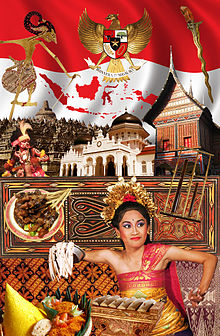Religion in Indonesia (2023)[1][2]
| Religion by country |
|---|
|
|

| Part of a series on the |
| Culture of Indonesia |
|---|
 |
| People |
| Languages |
| Mythology and folklore |
| Cuisine |
| Literature |
| Music and performing arts |
| Sport |
Several different religions are practised in Indonesia. Indonesia is officially a presidential republic and a unitary state without an established state religion.[3][4] The first principle of Indonesia's philosophical foundation, Pancasila, requires its citizens to state the belief in "the one and almighty God".[5][6] Although, as explained by the Constitutional Court, this first sila of Pancasila is an explicit recognition of divine substances (i.e. divine providence) and meant as a principle on how to live together in a religiously diverse society.[7] Blasphemy is a punishable offence (since 1965, see § History) and the Indonesian government has a discriminatory attitude towards its numerous tribal religions, atheist and agnostic citizens.[8] In addition, the Aceh province officially applies Sharia law and is notorious for its discriminatory practices towards religious and sexual minorities.[9]
Several different religions are practised in the country, and their collective influence on the country's political, economic and cultural life is significant. Despite constitutionally guaranteeing freedom of religion,[10] the government back in 1965 recognises only six religions: Islam, Christianity (Catholicism, under the label of "Katolik", and Protestantism, under the label of "Kristen" are recognised separately), Hinduism, Buddhism and Confucianism.[11] [12] In that same year, the government specified that it will not ban other religions, specifically mentioning Judaism, Zoroastrianism, Shinto, and Taoism as examples.[11] According to a 2017 decision of the Constitutional Court of Indonesia, "the branches/flows of beliefs" (Indonesian: aliran kepercayaan) - ethnic religions with new religious movements - must be recognised and included in an Indonesian identity card (KTP).[13][14] Based on data collected by the Indonesian Conference on Religion and Peace (ICRP), there are about 245 unofficial religions in Indonesia.[15]
From 1975 to 2017, Indonesian law mandated that its citizens possess an identity card indicating their religious affiliation, which could be chosen from a selection of those six recognised religions.[16] However, since 2017, citizens who do not identify with those religions have the option to leave that section blank on their identity card.[8] Although there is no apostasy law preventing Indonesians from converting to any religion, Indonesia does not recognise agnosticism or atheism, and blasphemy is considered illegal.[17] According to Ministry of Home Affairs data in 2023, 87.06% of Indonesians identified themselves as Muslim (with Sunnis about 99%,[18] Shias about 1%[19]), 10.47% Christians (7.41% Protestants, 3.06% Roman Catholic), 1.68% Hindu, 0.71% Buddhists, 0.03% Confucians and 0.05% others.[20]
- ^ "Religion in Indonesia".
- ^ Muslim 244 Million (87.1), Christianity 29.4 Million (10.5), Hindu 4.73 million (1.7), Buddhist 2 million (0.7), Confucianism 76.019 (0.03), Folk and others 99.045 (0.04), Total 280.725.428 Million
- ^ Da Costa, Agustinus Beo (12 October 2019). "Indonesia urges public to report civil servants over 'radical' content". Reuters. Retrieved 14 June 2022.
- ^ Hosen 2005, pp. 419–40; Intan 2006, p. 40; Seo 2013, p. 44; Ropi 2017, p. 61 etc.
- ^ Prinada, Yudi (2 December 2020). "Beda Isi Piagam Jakarta dan Pancasila Sejarah Perubahannya". tirto.id (in Indonesian). Retrieved 9 June 2022.
- ^ Lindsey & Pausacker 1995; Intan 2006, p. 18.
- ^ "Indonesia Negara Ketuhanan" (PDF). mkri.id. Retrieved 8 March 2023.
- ^ a b US State Dept 2022 report
- ^ Pringle 2010, pp. 154–55; Buehler 2016.
- ^ – via Wikisource.
- ^ a b [The explanatory memorandum for Article 1 of Presidential Edict No 1 of 1965 on the Prevention of Abuse and/or Blasphemy of Religion] (in Indonesian) – via Wikisource.
- ^ Hosen 2005, pp. 419–40; Shah 2017; Marshall 2018, pp. 85–96.
- ^ Sutanto, Trisno S. (26 April 2018). "The Decolonization of Adat Communities: Notes from PGI's 2018 Seminar on Religions". Center for religions and cross-cultural studies Graduate School, Universitas Gadjah Mada. Archived from the original on 1 April 2019. Retrieved 28 February 2019.
- ^ Marshall 2018, pp. 85–96.
- ^ Aritonang, Margareth S. (7 November 2014). "Government to recognise minority faiths". The Jakarta Post. Retrieved 2 October 2006.
- ^ "International Religious Freedom Report 2008. Indonesia". US Department of State. Retrieved 31 March 2014.
- ^ "Report of the Office of the United Nations High Commissioner for Human Rights" (PDF). Archived from the original (PDF) on 25 September 2017. Retrieved 25 May 2017.
- ^ "Sunni and Shia Muslims". Pew Research Center. 27 January 2011. Retrieved 31 March 2014.
- ^ Atjeh 1977; Lindsey & Pausacker 1995, p. 271.
- ^ "Jumlah Penduduk Menurut Agama" (in Indonesian). Ministry of Religious Affairs. 31 August 2022. Retrieved 29 October 2023.
Muslim 241 Million (87), Christianity 29.1 Million (10.5), Hindu 4.69 million (1.7), Buddhist 2.02 million (0.7), Folk, Confucianism, and others 192.311 (0.1), Total 277.749.673 Million